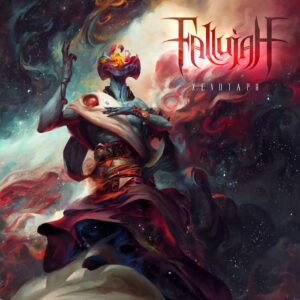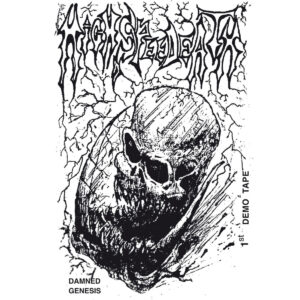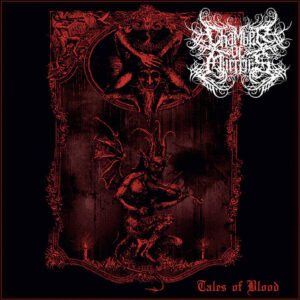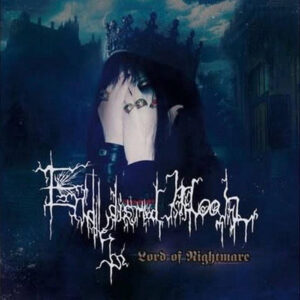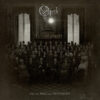Colony
Starscape
•
April 20, 2021
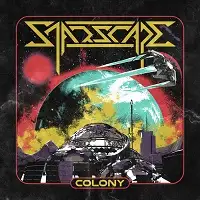
The two Swedes of STARSCAPE – and their "intergalactic metal" influenced by '70s hard rock – are as oddball a pairing as any you've likely heard before. Singer Per-Olof has a very deadpan, almost non-musical delivery – he's just basically keeping the tune (he's not a "Singer," capital S). It gives the music a vaguely punk quality, reminiscent of some of those '80s New Wave bands where the singers weren't, well, terribly technically proficient. He's often just slightly off-key, he's got no real vibrato to speak of, he gets a little nasally and sing-song, he has no idea of phrasing. He's raw and uninhibited. But this isn't criticism – it's just so different to hear a voice like this in this context, where you have an obviously skilled multi instrumentalist in Anton (one who writes supremely sophisticated arrangements) and a guy who, well, can't really sing – or maybe just chooses not to. But it works.
They sketch out the story of "Colony," an "epic tale of journeys beyond the stars" (the follow-up to 2020's two-track release "Pilgrims") with a minimum of effort and no excessive details. There's absolutely no rhyme scheme in the lyrics whatsoever, they barely even fall into a verse-chorus pattern; it's like they're actually reciting lines from a book or short story. So songwriting-wise, it's absolutely unique. With its spacey programming effects, "Pilgrims Of The Stars" is definitely sci-fi sounding; a hectic initial riffing melody is touched upon repeatedly as a reference point throughout, very like early RUSH or YES (they've been compared to MANILLA ROAD too, and remind me, in that vein, of the Pittsburgh band LEGENDRY, who are influenced by those same bands). So we learn this is about "Mankind's escape from a dying Earth in search of a new world," as they say on their Facebook page track-by-track rundown, and indeed, the lyrics describe that – "there's nothing for us left," they say, the planet is "nothing but a barren waste" – and they take responsibility for it, "We've drained her of all nurture, our stewardship has failed." Many will remain and perish ("For all those left behind, a certain doom draws near"); they don't seem to feel bad about that, but are instead optimistic, saying "Coordinates set to start anew" and "Now the future is in our hands," and "The cargo that we hold is the fate of all mankind." In keeping with this, they call their ship "the ark," which is, of course, fitting. The last take on the chorus has a rather eerie organ melody accompanying it and the fadeout is that same initial groove trimmed to its bare low-end essence.
The musical underpinnings of "Interstellar" – the bass lines, the guitar melodies and chugs, the little bits of vocal overdubbing in the verses on certain lines – are a joy, real ear candy. This is the real farewell, what they call "man's inevitable exodus from Earth," after the previous track, which is the preparation, the building-up of purpose, the cheerleading (this is a big adventure and how heroic are we). The first verse is business-like, "Cast loose our vessel ... "with tearful sight/The pale blue dot is gone" but the prechorus (if you can call it that, because there's no actual chorus) is a bit more thoughtful and emotional – you can feel the uncertainty setting in when Per-Olof asks, "Is it foolishness/To pray to earthbound gods/To save celestial souls?" The second verse describes how the travelers are preserved "in cryonic state" for their travels, in a "sarcophagus of steel"; the third is the journey ("The dark engulfs the ark/We sail the black vast seas/Of interstellar space") and a repeat of that plea to the gods. By the fourth verse, we've arrived ("Across the ocean/Land is in sight/At last the slumber stops") and everything slows as if to echo that – the riffing calms, the bass burbles, the drums ease away, and it ends on a chord filled with optimism.
Bass carries the title track, with bursts of guitar chords to emphasize, before a treble melody and a much faster tempo set in. The drums are deft and light even in the speedier section where the hi-hat joins in; those tempo changes are effortless. Per-Olaf's anguished roar as the song opens is a treat and then he marches into the verse, where the pilgrims are ready to land and see their new home – his mock deep stentorian voice is kind of a hoot as he describes the process ("Prepare the vessel for orbit/The sphere is approaching fast"). It's a case of so here we are despite ourselves, in the second verse ("Surprised that the hull is intact"), but we're kind of afraid to get out of the ship ("In silence they gather the courage/Courage to release the hatch"). The chorus warns that the real work is still to begin, that "the real quest still remains of establishing a colony/A settlement securing the future of our species." They note on their Facebook page that "as colonization is in full progress, the song shifts gears," and indeed it does – the swing settles down a little as if to show that the work is being done after the frantic quality of the music accompanying the journey.
"A New World" is a delicate ballad, filled with wonder in its lilting 6/8 melody. Per-Olof's voice, too, is thoughtful and observational; he's not one of the pilgrims here, he's just watching them. There's a lovely quiet interlude after the first two verses, as if to take it all in and let it sink in (the pilgrims "gaze in awe" with their "excited eyes" and see "a new world untouched and betrodden by none" and "amazing sights appear as explorations proceed" and "the wonders unfold"). The chorus is more intense, with lashings of very '70s-esque organ, as the awe disappears and uncertainty and the weight of responsibility sets in ("Strange are the sights that the settlers now face/A new world yet touched by no hand"). His voice intensifies in the second verse in describing what they are seeing ("Streams of silver water" and "lakes of unthinkable dark depths'' and "hills made of ash"). It's kind of saying this is a new place after all and might be unfriendly, so proceed with care – after the ruminative solo, there are two lines of clear warning, "Neath a new moon explorers now rest/but the peace might not last very long."
Guitar and organ give "Not Built By Human Hands" an ominous feel, in keeping with the last lines of the preceding track. Per-Olof's voice gets more insistent and overwrought (again acting as observer) as he shouts out the action faster and faster, his words tumbling over themselves. Their Facebook page says that this describes "what horrors the pilgrims uncover in their exploration of the new world," but the lyrics hint at it only: "An insatiate lust firmly grips all the settlers/It will cease their souls, leading them into darkness" (we don't know what this lust is yet) and they are "Indulging the goods yet still tempted by more/their ravenous hunger lures them away." The chorus mentions "structures of repulsion," "artifacts of alien making/Cryptic symbols and distorted structures/This abomination cannot be man's creation" (we still don't know what these) are and this is good suspense-building. The chorus is repeated, but not before we learn that the settlers "Flee now fast in terror, from nameless foes of horror."
The instrumental "Structures" is just short enough to appreciate – it's not repetitive enough to be numbing (you do want some to have music to latch on to and get into, and it gives you that in its variations on the main melody riff) and it's not all-over the-place enough to be confusing or muddled (but it gives you variety in the hints of cowbell, the very '70s cheery-sounding organ, and the shifts in tempo). Ever so quietly, an organ starts the climactic 10-minute closer "Towards The Unknown'' like a dirge, slowly swelling in volume, melody and harmony meshing compellingly together. The narrator foreshadows the chorus, and the whole plot of the song, when he says, "What once was salvation, is now our certain doom/Towards the unknown we now must go," and the drums start the funky groove that the guitar riffs make their own. It's still not clear what this horror was that made the pilgrims leave, but it's eerily reminiscent of what happened to make them leave Earth ("Pray for the souls of those we've left behind" – well, they've had to do that before – and "the settlement is in ruins and the colony has fallen"). So the "crestfallen pilgrims board the ark in haste" yet again, and off they go into space with no clear destination in mind ("With dread in our souls, descend to sleep once again"). In the bridge, Per-Olof mulls over "With no set goal, we cast loose once again" (the lot of the pilgrims) and "No man can tell what fate is awaiting those we've left behind" (the lot of the stranded settlers), and finally asks, "It's unclear who drew the shortest straw, was it us or them?" In another bridge, we again see the pilgrims going back into stasis, "not knowing if we will wake up again," then a reprise of the prechorus and chorus, and at last the cliffhanger as the pilgrims drift off on this "aimless voyage ... "with eyes that watch them shining deep in the dark." Hmmm, whose eyes are those? We're told it's "a tale to be told another time." Music similar to the beginning serves to end it, with lots of bass and a repeated organ melody that in some weird way caps it off perfectly – it just has that coda-esque, as-the-credits-run quality, and it's such an earworm, you don't want it to end.
So is this a cautionary tale or a parable? Like we'd better stop messing up Earth while we still can, because who knows what awaits us out there if we have to leave it? Is it holding up a mirror to humankind, that shows us no matter where we go, we're likely to mess things up? What an interesting little record this is, one that will surely divide listeners as well as delight them.
9 / 10
Almost Perfect
Songwriting
Musicianship
Memorability
Production

"Colony" Track-listing:
1. Pilgrims Of The Stars
2. Interstellar
3. Colony
4. A New World
5. Not Built By Human Hands
6. Structures
7. Towards The Unknown
Starscape Lineup:
Per-Olof Goransson - Vocals
Anton Eriksson - Instruments
More results...
